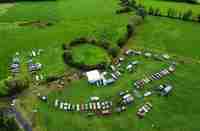Farmers turned beekeepers on Corracreigh Group Water Scheme (GWS) in Co. Roscommon are creating a buzz as they spread the word on the danger of pesticides to their honeybees, the local drinking water source and to wider biodiversity.
The ‘Let it Bee’ initiative started early this summer, when the Rushes, the Kellys and Durrs received honey beehives and began learning how to become beekeepers.
Local GWS manager, Thomas Rushe, is the driving force behind the project. As an organic farmer and manager of his local group water scheme, he knows the damage that pesticides are doing to local drinking water sources and to biodiversity generally.
“I’m very aware that water quality can be impacted by farming practices. Our water source is very vulnerable to pollution and is something we’re watching for all the time. Bees are a very visible reminder that we need wildflowers in the landscape. This is a message that people can relate to”.
Apart from issues arising from pesticide use, he points out that “slurry spreading in wet conditions is one of the biggest dangers to the water source”.
Cattle and sheep farmer, Jude Walsh, is mentor to the beekeepers of Corracreigh. He draws a parallel between “honeybees that work together for the benefit of their hive, their community” and the people of Corracreigh who, he says, “need to work together for the benefit of their drinking water supply”.
Recognising that it’s not just the farming community that is using pesticide, the youngest beekeeper, Rory Durr, is keen to see householders pull back from spraying pesticides in their gardens. Domestic pesticide use is, therefore, a major focus of the ‘Let it Bee’ initiative.
Recently the buzz has been heard in neighbouring Mid-Roscommon GWS, with three farm families signing up. Edward and Jennifer Payne and their son Ben from Hilltop Dairies were first to take the step, while the Kellys and Durrs have also installed hives on their farms.
Thomas Rushe is convinced that it won’t stop there: “This project is really raising awareness. Keeping honeybees and creating habitat for our wild bees and butterflies has the potential to change attitudes to farming practices. You are less likely to spray dangerous chemicals when you understand the harm that they cause”.
In a bid to further enhance biodiversity-appreciation in the community, work is underway to construct 330 ‘bee hotels’ to be distributed to every family on Corracreigh GWS, thereby providing multiple nesting sites for wild bees and other pollinators.






